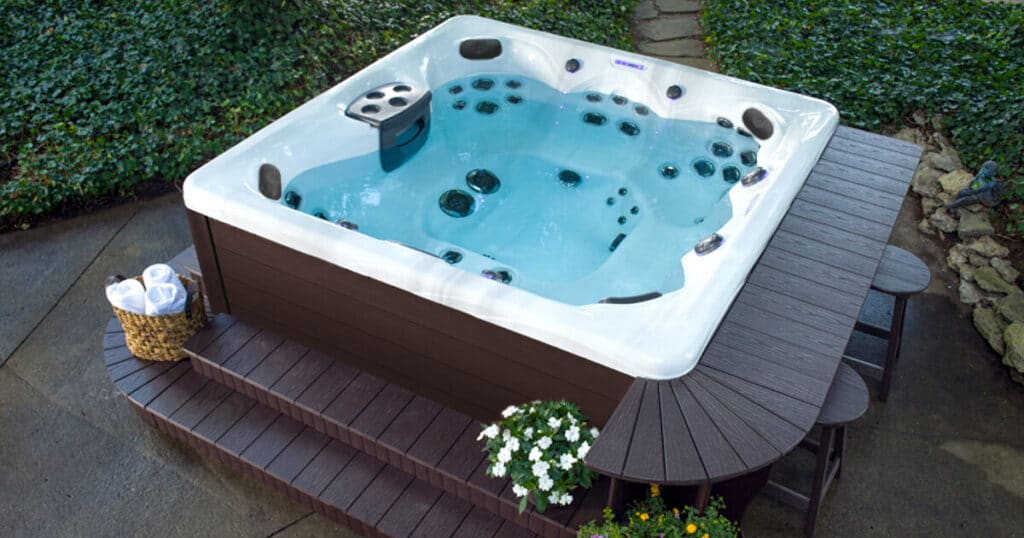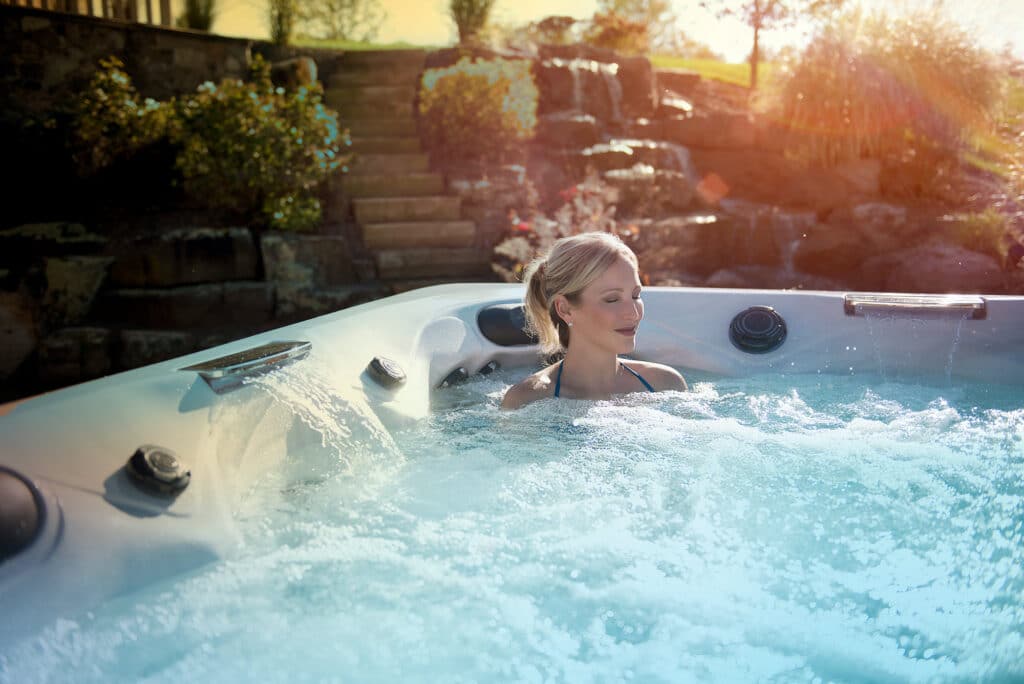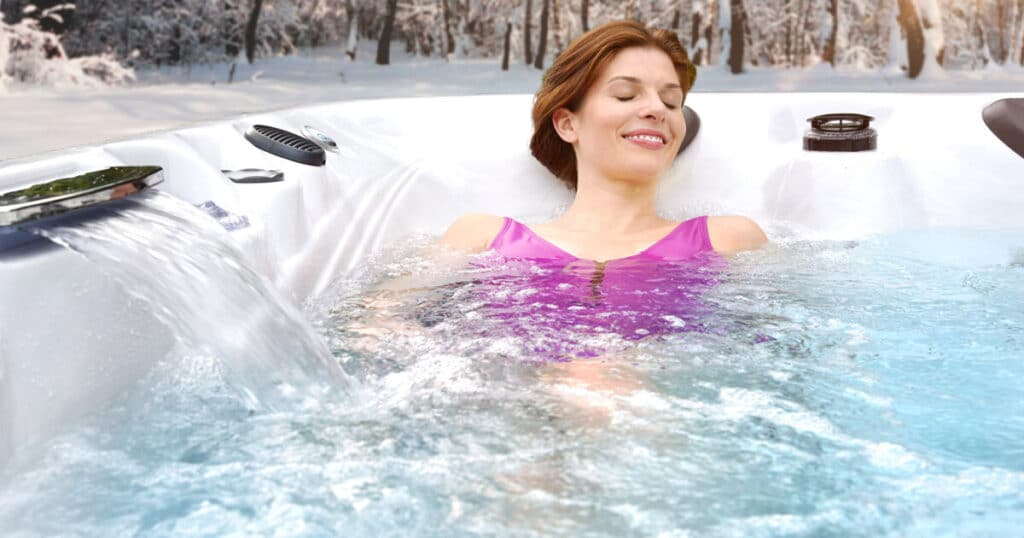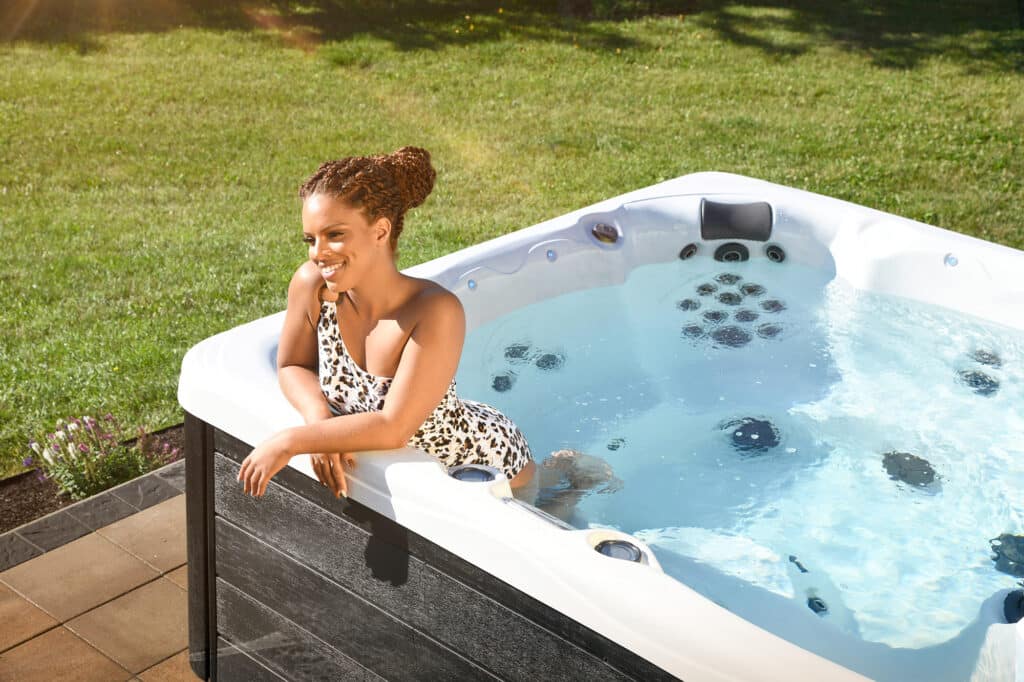A hot tub is all about relaxing in the water. But when you are shopping for the best hot tub, you might not have anticipated that you were going to really have to think about water. Chlorine, bromine, salt water — it can feel like there are a sea of options to navigate.
You want a spa that’s easy to maintain and enjoy. But which type of hot tub is the right choice? You may have heard about saltwater hot tubs, but maybe you’re not sure how they compare to traditional systems and if it’s worth the investment.
Whether you are considering adding a hot tub to your home or upgrading your existing one, this guide will help you explore the benefits and practicalities of saltwater systems.

What is a saltwater hot tub?
A saltwater hot tub uses a salt chlorine generator to clean the water instead of relying on adding chemical sanitizers like dichlor granules. The system converts salt into chlorine through a process called electrolysis, maintaining clean and clear water with fewer added chemicals.
The Master Clear Salt System uses a Smart Cell to generate just the right amount of sanitizer to keep the water clean, with a lower salinity than other systems. This creates a gentler soaking environment while reducing the need for regular chemical additions.

Benefits of a saltwater hot tub
Saltwater systems offer a range of benefits that enhance your hot tub experience and make maintenance easier.
Softer water: Salt water feels silkier and more soothing on the skin compared to traditional chlorine-treated water.
Gentler on skin and eyes: Salt water is less likely to cause irritation, making it ideal for people with sensitive skin or allergies.
Lower maintenance: Smart salt systems, like the Master Clear Salt System, can simplify hot tub care. While you’ll still need to monitor key water chemistry levels like alkalinity and pH, the system maintains ideal sanitizer levels. You will not have to adjust the sanitizer level as frequently, making your hot tub experience more enjoyable.
Cost savings: While the upfront cost is higher, salt water systems can reduce long-term expenses by minimizing the need for chemical purchases.

Saltwater hot tub FAQs: Common questions answered
Curious about using salt water in a hot tub? You’re not alone. From how saltwater systems work to what makes them different, many people have questions. By understanding the basics, you will be able to decide if a saltwater system is the right fit for your lifestyle and backyard.
How does a saltwater system work?
A saltwater system simplifies hot tub maintenance by using salt to produce chlorine naturally. Here’s how it works:
Add salt to the water: Start by adding a specific amount of salt to your hot tub when filling it with water. The amount depends on the system you’re using, the size of your spa, and how often it will be used.
Chlorine generation: The system’s generator converts the salt into chlorine through a process called electrolysis. This chlorine sanitizes the water, keeping it clean and safe for soaking.
Consistent performance: Depending on the system, the chlorine production rate might be adjustable. Some systems allow users to set levels based on the manufacturer’s recommendations, while others generate chlorine automatically based on sanitizer levels. Advanced systems can even monitor these levels and produce chlorine only when needed, preventing overchlorination.
Eco-friendly cycle: Once the chlorine has done its job, it breaks down and reverts to salt, creating a continuous cycle that reduces chemical waste.
How do I maintain a saltwater hot tub?
Maintaining a salt spa involves a few key steps.
Check salt levels: Use the Master Clear app to make sure that the salt concentration stays within the recommended range.
Monitor water chemistry: Keep an eye on pH, alkalinity, and calcium hardness to prevent imbalances.
Replace the salt cell as needed: The Master Clear Smart Cell has a lifespan of about a year, depending on usage and maintenance.
Clean the generator cell: Over time, calcium can build up on the generator cell. You might need to clean the cell for optimal performance. Refer to the owner’s manual for more information.
How much salt is needed for a hot tub?
When you hear “salt water,” your mind might drift to ocean waves rather than a hot tub. But a spa is nothing like the Pacific or Atlantic. Ocean water has a salinity of about 35,000 parts per million (ppm), which gives it its characteristic taste and feel. In contrast, saltwater hot tubs use a much lower concentration of salt, typically around 2,000 to 3,000 ppm. This mild salinity creates water that feels gentle and soothing, without a briny taste or residue.
The Master Clear Salt System takes this a step further by operating at an even lower salinity — about 1,200 ppm — making your hot tub experience even more comfortable and refreshing.
Your owner’s manual will include instructions for determining how much salt to add when you get started.
Can I use regular table salt in my hot tub?
No, you should only use salt specifically designed for use in hot tubs or pools. Table salt often contains additives that can affect water chemistry and damage your system. Pool-grade or hot-tub-grade salt is free of these additives and dissolves easily in water.
Master Spas recommends using Master Clear Salt Plus, which is an additive-free spa salt.
Are saltwater hot tubs expensive?
Hot tubs with a salt system tend to cost more up front than traditional models, mainly because of the added equipment, like the Smart Cell and controller included with the Master Clear Salt System. While the initial price is higher, the ongoing costs can be lower. You’ll spend less on chemicals over time, and salt systems are designed to require less maintenance. This means fewer headaches and potentially less money spent on professional servicing. For many people, the convenience and savings make the investment worth it in the long run.
Is salt water corrosive to spa components?
Salt water can be slightly more corrosive than traditional hot tub water if the water isn’t balanced correctly. However, smart systems are designed to minimize this risk by operating with low salt concentrations and automating water care.
For example, the Master Clear system monitors sanitizer levels and only activates when they drop below your preferred setting. This prevents overchlorination, helping to protect your hot tub’s components while ensuring the water stays clean and comfortable.
Are saltwater hot tubs better for the environment?
Saltwater hot tubs are often considered more eco-friendly because they reduce the use of chemical sanitizers and packaging waste. Additionally, the water in saltwater systems may last longer before needing to be replaced, conserving water resources. Proper care and maintenance are essential to maximizing these environmental benefits.
How does salt water affect skin and hair?
Salt water is much gentler on skin and hair compared to traditional chlorine-treated water. It’s less likely to cause dryness or irritation that can be associated with hot tubs. In fact, some users report that their skin feels softer and more hydrated after soaking in a saltwater hot tub.
Is a saltwater hot tub worth it?
For many people, the benefits of a saltwater hot tub make it a worthwhile investment. If you prioritize comfort, eco-friendliness, and convenience, a saltwater system could be an excellent choice.

How to buy a saltwater hot tub
Are you ready to invest in your well-being and backyard? Master Spas hot tubs can be enjoyed this year and many years to come. Click here to learn more about the benefits of hydrotherapy. Or, contact your local Master Spas retailer to learn more about hot tub ownership. Wondering how much a Master Spas hot tub costs? You can request a quote here.


